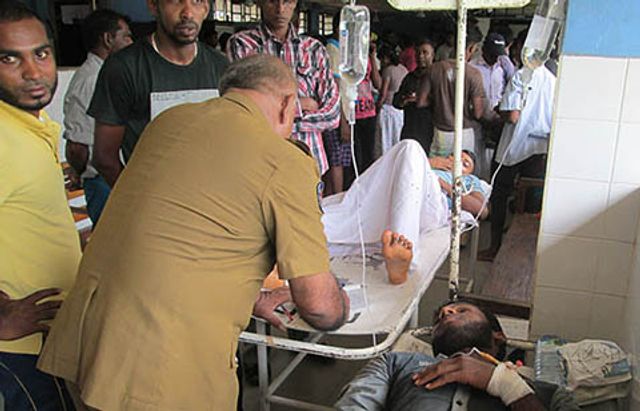by ROHINI MOHAN
 Muslim youth at the hospital PHOTO/World Socialist Web Site
Muslim youth at the hospital PHOTO/World Socialist Web Site
When I met Watareka Vijitha Thero in early 2014 in a suburb of Colombo, the Sri Lankan capital, he had been in hiding for nearly five months. The gentle-voiced monk had spoken out against anti-Muslim fearmongering by a hard-line group called the Buddhist Power Force, known by its Sinhalese initials B.B.S.
Mr. Vijitha’s car was attacked in retaliation, and he narrowly escaped. “What does it mean for Buddhism if those that speak for communal harmony have to hide in fear?” he asked me. “What does it mean for my country that the government lets these lawless thugs have a free run?”
Six months later, Mr. Vijitha was found on a road near Colombo stripped naked and bloody, his hands and legs bound. The B.B.S. denied involvement. When the monk filed a complaint, the police threw him in jail for 12 days on charges of self- inflicted violence — a warning to others who dared to criticize hard-line Buddhists.
Three years ago, the B.B.S and other hard-line groups were fringe elements. Today, they are a powerful force, and their aggressive assertion of Sinhalese Buddhist dominance, in a country that is 70 percent Buddhist, is increasingly mirrored in government-approved revisionist histories of Sri Lanka.
Now, with the country’s president, Mahinda Rajapaksa, facing a challenger in elections on Thursday, hard-line Buddhist groups have mobilized to support him. A wave of populist chauvinism has engulfed the country and sidelined the Tamil and Muslim minorities that make up over a quarter of the population. If it continues unchecked, Sri Lanka will face more instability, ethnic polarization and suppression of dissent.
Extremist Buddhist monks are confounding; they directly contradict a canonically nonviolent religion often perceived as apolitical. Like radical monks in Thailand and Myanmar, Sri Lankan hard-liners reserve special ire for Muslims. The B.B.S. and its counterparts have incited mobs to demolish mosques. A June speech by the B.B.S. chief Galagodaththe Gnanasara triggered anti-Muslim rioting in Sri Lanka’s southern villages; thugs burned homes, four people were killed and at least 80 were injured. But instead of arresting Mr. Gnanasara, the president simply urged “all parties concerned to act in restraint.”
The New York Times for more
